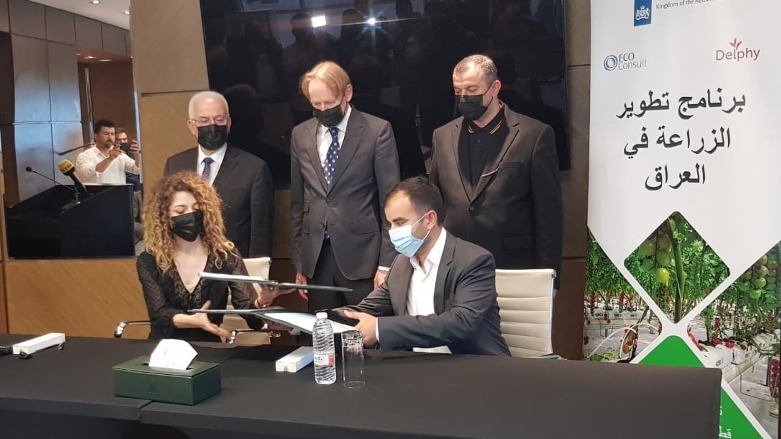Dutch-funded program signs second agreement to boost agriculture in Kurdistan
Produce imported to Kurdistan Region "is more expensive" and "not so fresh," so the region producing its own vegetables is "much better and is healthier."

ERBIL (Kurdistan 24) – The Dutch Consulate General on Monday hosted a second signing ceremony for the Iraq Horticulture Development Program (IHD), funded by the Dutch government, in the attendance of senior Kurdish officials Sulaimani city.
Officials from Kurdistan Region’s Ministry of Agriculture and Water Resources, Sulaimani’s Directorate of Agriculture and Water Resources and the Directorate of Kurdistan Investment, and Sulaimani Governor Dr. Haval Abubaker, attended the event.
The agreement was signed between the IHD and implemented by ECO Consult, represented by Nawa Sarbast, and the lead partner in Sulaimani, Ranj Farhad Beg.
The four-year program aims to increase the resilience of market systems and strengthen knowledge among farmers about efficient and sustainable horticulture management. Under the agreement, the IHD will assist in building a climate-smart, and innovative hydroponic greenhouse in Sulaimani specialized in producing leafy greens.
The project will also provide technical assistance and train farmers to help them understand and use new agricultural technology, boost their productivity, increase market linkages, and assist them in tackling environmental challenges and responding to market needs.
The Dutch Consul General in Erbil, Hans Akerboom, told Kurdistan 24 that the Dutch government wants to support the Kurdistan Region’s domestic agricultural production that is “healthy and cheaper.” The region imports heavily from neighboring Turkey and Iran to meet local demand.
The imported produce “is not as good as expected and is more expensive and is not so fresh anymore, so” Kurdistan Region producing its “own vegetables is much better and is healthier,” he added.
Related Article: Kurdistan, Dutch prime ministers talk strengthening bilateral ties
The first Dutch-funded project was initially started in Erbil in December. The program is focused on creating a 5,000-square-meter hydroponic multi-span greenhouse south of Erbil that will produce “vegetables, like cherry tomatoes and colorful peppers.”
Read More: Dutch-funded program signs agreement to boost agriculture sector in Kurdistan Region
These will be followed by similar projects in Baghdad and Basra to build on the Netherlands’ long-standing cooperation with the Ministry of Agriculture in Baghdad as well as with the Kurdistan Regional Government.
Editing by Khrush Najari